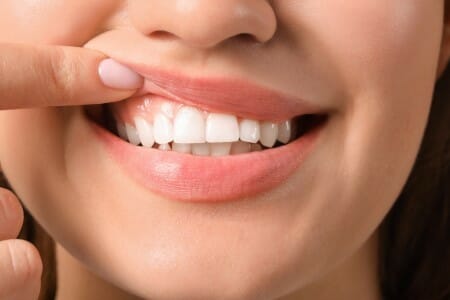When it comes to overall health, you may be tempted to put too much emphasis on your tooth health. While the health of your teeth is immensely important, you can’t overlook your gums. Even if your teeth are picture-perfect, cavity-free and without issue, your gums can become diseased and eventually cause significant problems that negatively affect your teeth. Thankfully, by following the six tips listed below you can keep your gums healthy and promote oral wellness throughout your entire mouth.
1) Floss Daily
While you likely know the importance of brushing your teeth twice daily as recommended by the American Dental Association, you might not realize that flossing is just as important for gum health. You use a toothbrush to clean your teeth and tongue, removing food and plaque from the teeth themselves. However, food particles and plaque can settle in between the teeth where it’s difficult if not impossible to remove with brushing alone. By adding flossing to your daily regimen, you keep those hard-to-reach areas clean and healthy. Don’t worry if you experience a little bleeding if you are unaccustomed to flossing. This is normal until your gums get used to the act of flossing.
2) Make Sure You Get Regular Professional Cleanings
Another important step to take to promote gum health is to make sure you get regular dental cleanings. In most cases, dental professionals advise you to get a professional cleaning at least every six months. Professional cleanings go above and beyond what you can do at home on your own. They successfully remove tartar and ensure any remaining plaque is removed. In fact, if you have gingivitis, regular professional cleanings, along with flossing and brushing can even help reverse this problematic condition.
3) Brush Your Teeth Twice Daily
As mentioned above, it’s important to brush your teeth at least twice a day to keep bacteria at bay. This is important for tooth health, obviously, but also for gum health. You can select a comfortable toothbrush that is soft, firm, or electric. What type of toothbrush you use isn’t nearly as important as the act of brushing itself. Electric toothbrushes do tend to remove more plaque than manual brushes, though, so if you often have an excess buildup of plaque, it might be worth a try. Make sure you change out your toothbrush or toothbrush head— if you have an electric model— around every three months. This will ensure the bristles are still working as designed.
4) Stop Smoking
If you are looking for a reason to quit smoking, your gum health could be your motivation. Gum disease and smoking are closely associated. In addition, smoking weakens your natural immunity, which can make it harder for you to fight off a gum infection should you get one. Therefore, if you smoke, now would be a good time to stop!
5) Try a Therapeutic Mouthwash
Therapeutic mouthwash successfully reduces or prevents gingivitis, reduces plaque, and can alter the speed at which you develop tartar on your teeth. It also removes excess food particles and debris from your mouth. While it’s not an adequate substitute for brushing and flossing, adding a therapeutic mouthwash can be a great addition to your oral health regimen.
6) Use a Fluoride Toothpaste
Make sure any toothpaste you choose to use contains fluoride. This is the only way to ensure that it promotes healthy gum health. Of course, you could also opt for a variety that whitens your teeth, freshens breath, or more, just make sure it also includes fluoride to combat gingivitis and promote overall gum health.
What Happens If You Don’t Promote Good Gum Health?
The above six tips are key in preventing gum issues and keeping your gums healthy. The reason they are so important, though, is that you want to do everything in your power to prevent gum disease.
What is Gum Disease?
Gum disease, also known as periodontitis, sometimes but not always leads to the more severe disease gingivitis. Many people end up getting gingivitis at some point in their lives. Since the symptoms are often mild, it is often ignored, which isn’t wise because leaving it alone can result in the development of more severe gum issues. It can lead to infections in the gums and even the jawbones themselves, which will eventually lead to advanced gum disease and tooth decay.
What Are Symptoms of Gum Disease?
Since gum disease is easy to overlook, many people don’t even realize they are developing a gum-related condition. The following are the most common symptoms of gum disease. You should let your dental professional know if you are having any of the following symptoms.
- Swollen or red gums. Healthy gums are firm and pink.
- Receding gums.
- Persistent bad taste in your mouth or bad breath.
- Bleeding during and after brushing.
- Shifting or loose teeth.
- Changes in the way your teeth fit together when you bite down or changes in the way your partial dentures fit.
- Deep pockets between gums and teeth.
Come See Us Today at Eastgate Dental Excellence
In most cases, gum disease can be reversed once it is discovered and treatment is started. The six tips listed above are key in creating healthier gums by preventing gum disease. They are also the best way to address gum disease once it’s present and reverse the damage. If you think your gums might be inflamed or unhealthy or in any way diseased, the quicker you can begin treatment, the better results you will have when it comes to promoting healthy gums. Contact us at Eastgate Dental Excellence to schedule a visit to see our dental professionals. Let us examine your gums and look for signs of disease. We will come up with a plan to address any potential issues before they become a full-blown problem.
Sources:
https://oraluxdental.com.au/6-ways-to-keep-your-gums-healthy/
https://www.webmd.com/oral-health/guide/gingivitis-periodontal-disease

